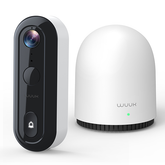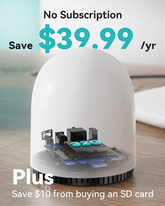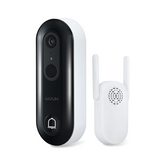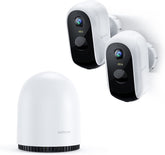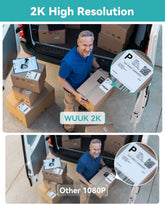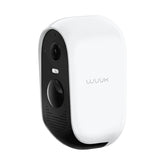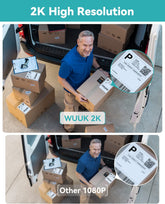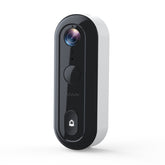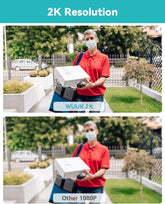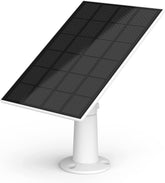What Security Cameras Should I Use at Home?
Introduction
The peace of your home should never be disturbed by worries about security. In this digital age, leveraging technology to protect your family and property has become more accessible than ever. Home security cameras, a cornerstone of this protective layer, not only serve as an excellent deterrent to potential intruders but can also provide invaluable footage in the unfortunate event of a break-in. With the market offering an array of choices, deciding on the right security cameras for your home might seem daunting.
But fear not! This guide is designed to help you explore security cameras, illustrating the key considerations and guiding you to make the right choice based on your unique needs. Here, you'll learn about the importance of understanding your security needs, the differences between indoor and outdoor cameras, how many cameras you might need, the wired vs. wireless dilemma, and the essential features your cameras should possess.
Should I Get Indoor or Outdoor Home Security Cameras?
The decision to choose indoor or outdoor home security cameras largely depends on your specific needs and the nature of the security concerns you wish to address. Here are some considerations to keep in mind:
Indoor Security Cameras
Monitoring Internal Activities: Indoor cameras are best for monitoring internal activities in your home. Whether you want to keep an eye on your children, elderly family members, pets, or even household staff, indoor cameras can provide the insight you need.
- Privacy Control: With indoor cameras, you have more control over privacy, deciding which rooms to monitor and when.
- Evidence Collection: In case of a break-in, indoor cameras can help in collecting vital evidence, such as a clearer view of the intruder's face or other identifying features.
Outdoor Security Cameras
Perimeter Security: Outdoor security cameras allow you to monitor your property's perimeter, including your yard, driveway, and entrances to your home. This can help deter potential intruders from attempting to break into your property.
- Preventive Measure: The mere presence of outdoor cameras can deter potential burglars, acting as a significant preventative measure.
- Monitoring Outdoor Events: Outdoor cameras also allow you to keep an eye on any events taking place outside your home, like monitoring a pool party or keeping an eye on your kids playing in the yard.
For comprehensive coverage, a combination of both indoor and outdoor security cameras often works best. Outdoor cameras can deter potential intruders and monitor outdoor activities, while indoor cameras can provide insight into what's going on inside your home. By using both, you get a complete surveillance solution that gives you peace of mind, knowing your entire property is monitored.

How Many Indoor Security Cameras Should I Need?
For a three-bedroom house, including living areas and entry points, 5-7 indoor cameras are needed. However, the number of indoor security cameras you need depends on several factors, such as the size of your home, the layout of rooms, and what specific areas you want to monitor. Here are some points to consider:
- Size of Your Home: Generally, larger homes require more cameras. Each camera has a specific field of view (FOV), the area that a camera can capture at any given moment. Cameras with a wider FOV can cover more space, but for larger homes, you might still need additional cameras to cover blind spots.
- Critical Areas: Identify the areas in your home that you consider to be the most important to monitor. Common areas include the living room, kitchen, baby's room, or any room where you store valuables.
- Entry Points: It's advisable to monitor all entry points - front and back doors, windows, garage, etc. Intruders typically choose these points for access, and having them under surveillance increases your chances of detecting any unauthorized entry.
- Layout of the Home: The layout and design of your home play a significant role in determining the number of cameras you need. Open floor plans might require fewer cameras, as one can cover multiple areas. In contrast, homes with many separate rooms or levels may need more cameras for comprehensive coverage.
- Purpose of Surveillance: Consider why you want to install cameras. If it's for general security, you may focus on entry points and common areas. If it's to monitor a specific activity (like keeping an eye on a new nanny), one or two well-placed cameras might be sufficient.
It's better to err on the side of caution and ensure all critical areas are covered. You might also want to consider a security audit from a professional who can assess your home and provide tailored advice.

Well, How Many Outdoor Security Cameras Should I Have?
About 3-5 outdoor cameras are needed in a typical household. Like indoor cameras, you are advised to consider the following points to determine the exact number of outdoor cameras:
- Size and Layout of Your Home: The number of cameras you need directly correlates with the size of your home. Generally, larger properties require more cameras for comprehensive coverage. Consider all levels of your home, too - basements and second or third stories may need their own cameras.
- Critical Areas to Monitor: There are likely areas within your home and its perimeters that demand more attention. Indoors, this may be rooms where valuable items are stored or spaces where family members spend significant time. Outdoors, it may be a large yard, a garage, a shed, or specific entries into your home.
- Entry Points: One fundamental use of security cameras is to monitor entry points. This typically includes front and back doors, windows, garage doors, and any other potential access points an intruder may exploit. Both indoor and outdoor cameras can serve this purpose effectively.
In total, a typical household might need around 8-12 cameras (a combination of both indoor and outdoor).
Should I Choose Wired or Wireless Security Cameras for My Home?
Deciding between wired and wireless security cameras largely depends on your personal needs and circumstances.
Wired security cameras are often praised for their reliability and high-quality video output. They use physical cables to connect to your network, reducing the chance of signal interference and providing a steady feed of high-resolution video. This can be critical for clearly identifying faces or license plates. However, the installation of wired systems can be more complex, requiring you to run cables throughout your property. It's also worth noting that in the event of a power outage, wired cameras without a backup power source might cease to function.

On the other hand, wireless security cameras provide the convenience of easy installation and flexibility in camera placement since they only require a power source and Wi-Fi signal to operate. They're often the go-to choice for renters or those who frequently move. Many wireless cameras also offer seamless integration with other smart home devices, enhancing your overall home security ecosystem. Nonetheless, wireless cameras rely heavily on your Wi-Fi network, and a weak or inconsistent signal can affect their performance. They are often battery-powered, too, necessitating regular battery checks and replacements.
Remember, the best system for you aligns with your home's layout, technical ability, and specific security requirements.
6 Key Features to Look for When Consider Security Cameras for Your Home
Let's delve deeper into how these features come into play in specific home scenarios.
- Resolution: A higher resolution provides clearer images, making it easier to identify faces or objects. For instance, if you have a high-resolution security camera installed in your living room, clear images will significantly improve your ability to monitor activity or retrospectively identify if an event of interest occurred. Always aim for cameras with at least 1080p resolution.
- Night Vision: Night vision is essential if you wish to monitor your property during nighttime. Like your backyard, it may not be well-lit during the night. Many cameras offer colored night vision, which provides more detail than traditional black and white. This feature ensures you can spot any intruders or anomalies, even in the dark.
- Motion Detection and Alerts: Some cameras can detect movement and send alerts to your smartphone. This real-time information can be crucial. Suppose you're at work, and your camera detects movement near your home's back entrance - you'll receive an instant notification, enabling you to act quickly in the case of suspicious activities.
- Two-way Audio: This feature allows you to communicate with people. This can be useful in a variety of situations at home. For instance, you can use it to talk to your kids playing in the garden from your office, or if you spot an intruder, you can warn them off via the speaker, potentially preventing a crime.
- Storage: Consider whether the camera stores footage in a local database (like an SD card) or the cloud. Imagine a scenario where an incident occurs when you're away on vacation. With cloud storage, you can access the footage from anywhere, making it easier to verify the incident and inform the authorities if necessary. However, if data security is a paramount concern, a local database might be more suitable as it reduces the risk of data breaches. Both storage methods have their pros and cons concerning cost, data security, and accessibility, and your choice will depend on your specific needs and circumstances.
- Solar power: One emerging trend for home security is solar-powered cameras. They are great for watching the outside, especially where wiring can be difficult, or there are no outlets. They are easy to install, good for the environment, and save money over time. Solar cameras charge using the sun's energy during the day, letting them work all night without stopping. This means watching continuously, which is helpful during power outages or in remote areas. Remember, your climate and how much sun the spot gets matter.
Top Recommendations
Still looking for your ideal security cameras? You are in the right spot! Experience a new level of home security with the WUUK Pan & Tilt Indoor Security Camera. Its 4MP Ultra HD resolution ensures crystal clear visibility of your home's interiors, while its wide pan and tilt range provides comprehensive coverage of your space. With smart detection features, the camera can identify motion, humans, and even a baby's cry, delivering real-time alerts to your phone. And don't worry about the dark - the enhanced night vision feature guarantees visibility up to 32.8ft even at night. Backed by secure storage options and two-way audio, this camera is ideal for those seeking round-the-clock monitoring and peace of mind. Manage everything effortlessly through the WUUK app, making home security more accessible and efficient than ever.
Or secure everything you value with the WUUK Wireless Cam Pro - a comprehensive security solution for your family. This outdoor security system offers 2K crystal-clear imaging and 2-way audio, allowing you to monitor every detail and engage in real-time communication. Truly wireless and equipped with a 9600mAh rechargeable battery, it's ready to go in minutes, withstanding all weather conditions thanks to its IP67 waterproof certification. Uniquely designed with human detection and night vision capabilities, the WUUK Cam Pro accurately captures every motion and activity, providing clear visuals even in the dark. Prioritizing your privacy and budget, this system doesn't require a subscription and includes a base station with built-in 32GB local storage to keep your data securely within your premises. With easy setup, dedicated customer service, and the elimination of inconvenient wiring, the WUUK Wireless Cam Pro is an investment in convenience and peace of mind.
Conclusion
Protecting our homes is an innate instinct we all share, and home security cameras are an excellent tool to enhance the safety of our sweet home. By understanding your unique security needs, assessing the type and number of cameras required, deciding between wired and wireless options, and ensuring your choice has the necessary features, you can significantly upgrade your home's security system. Each camera choice you make adds another layer to the safety net around your family and property, providing you with that invaluable peace of mind. After all, a home is not just a place - it's a feeling of safety and comfort. And it's WUUK's sincere hope that every home can harness the power of security cameras to keep those harmful elements at bay, ensuring that tranquility is never compromised.
Read More
- Solar Panels and Security Cameras: A Perfect Match– WUUK
- The Ultimate Guide for Choosine The Right Home Security Camera in 2023– WUUK
- The Ultimate Guide to Video Doorbells for Home Security 2023– WUUK
- Why a Smart Doorbell is a Must-Have for Home Security System?– WUUK
- Understand Battery Lifespan for Your Wireless Security Cameras– WUUK


